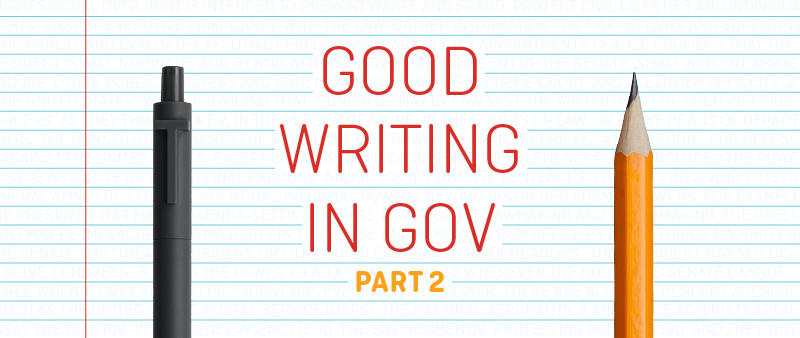Bad grammar is like a North Atlantic iceberg in the path of a steamship—one mistake can sink an otherwise impeccably crafted piece of writing. A great deal of grammar comes naturally to us, without much thinking—if it sounds wrong, it probably is. But the English language is also full of confusions, contradictions and archaic rules that the ordinary writer might not be aware of. With that in mind, let’s take a look at five common grammar mistakes to avoid in your next important report or high-stakes email.
- Subject-Verb Agreement
The agency revised their cost estimates for the project. What’s wrong here? Well, ‘the agency’ is a singular entity, and so the correct usage would be ‘its estimates,’ not ‘their estimates.’
- Who or Whom?
I reached out to the analyst who I spoke with earlier. This one can give people a lot of trouble, but the rule is fairly simple. In this case, the correct usage would be ‘the analyst whom I spoke with.’ That’s because the analyst is the object of the verb ‘spoke.’ Were the analyst the subject of the sentence, then ‘who would be correct, as in, “the analyst who works in the Washington office.”
- Unnecessary Apostrophe’s
The Human Resources Department kept to it’s side of the office. It can be tempting to use apostrophes in the wrong place to show possession—after all, it’s ‘Sarah’s pet tarantula,’ so why shouldn’t ‘its side of the office’ get to have an apostrophe as well? Because ‘it’ only gets one when it becomes a contraction (it is; it has).
- Dangling Modifiers
After ten years with the organization, the CEO fired Camila. It’s unclear here who has spent ten years with the organization—Camila, or the CEO? Assuming it was Camila, you could fix the sentence by changing it to, “After Camila spent ten years with the organization, she was fired by the CEO.”
- Then or than?
I dread that morning meeting more then any other. We all dread early morning meetings. But if you dread it the most out of all of your meetings, you dread it more ‘than’ any other. This is not a hard rule to remember; ‘than’ is used when you are making a comparison and ‘then’ is used when you are discussing time.





Leave a Reply
You must be logged in to post a comment.